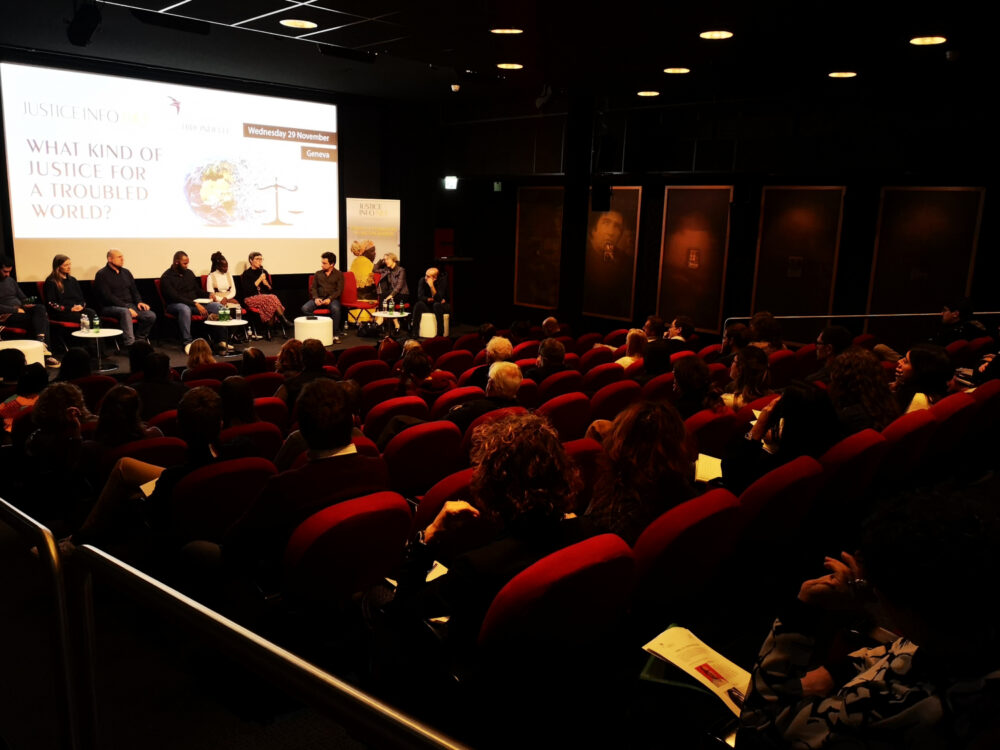At the end of November, ten correspondents from Justice Info, Fondation Hirondelle’s international justice website, were in Geneva to share their experiences at a conference on the theme “What kind of Justice for a Troubled World?”
Ukraine and Colombia – two major countries in Justice Info’s news – were represented at this event by Serhii Andrushko, adviser for its correspondent network in Ukraine, and Colombia correspondent Andrés Bermúdez Liévano. These are two countries where the justice system is active.
Serhii stressed the conditions in which Ukrainian journalists find themselves. “The first trials took place only a few months after the start of the war, when the tanks were still there,” he said. This poses a challenge for these professionals. “I think that for some journalists it can be a difficult time to cover a trial fairly,” he continued, as almost all of them have witnessed war crimes. Although journalists want to remain objective, “the situation has its impact”, he said. In Colombia, there is a “complete” model for deploying transitional justice tools, with a truth commission, a special court, and attention to reparations and disappearances. Andrès observed that, in this context where everyone is concerned, “more and more people in Colombia are asking for more and more information about the justice and peace processes”.
But in other parts of the world, justice is in more trouble. This is the case in Tunisia, Gambia and Mali, represented respectively by Olfa Belhassine, Mariam Sankanu and Boubacar Sidiki Haidara. These correspondents for Justice Info work in three countries where truth commissions operated for a time, and where the momentum has now died down. In the case of Tunisia, the commission, set up after the 2010 revolution, gave a voice to the victims only to then forget them, said Olfa, who spoke of “the State’s big lie”. Mariam described a similar situation in Gambia, where a commission with a strong public following was not followed up by authorities once its mandate was completed. Boubacar spoke of the Mali case, where a truth commission has never fulfilled its promises, and where the International Criminal Court has distributed only meagre reparations. The sums involved were deemed derisory, and were met with incomprehension. In his view, given the political context, “the transitional justice process in Mali is at a standstill, probably for several years”.
Janet H. Anderson, Justice Info’s correspondent in The Hague which hosts a number of international courts including the International Criminal Court (ICC), described how the ICC finds itself at the crossroads of East-West and North-South tensions. She described an ICC that has been solicited by all sides, particularly given the urgency of the conflicts in Ukraine and Palestine, but which after more than 20 years of existence has not succeeded in convicting a single state official. Moreover, she thinks trials conducted far from the victims can also be problematic for them.
But the field of transitional justice is rich and, for Justice Info, extends far beyond current conflicts, post-war or post-dictatorship situations. The conference highlighted the issue of returning cultural property and post-colonial reparation, addressed notably by Benin correspondent Rachida Houssou. She recounted the day in November 2021 when 26 pieces of art were returned from France, bringing joy and crowds to her country’s capital Cotonou. Two years later, the pieces are unfortunately still in boxes, as the construction of the planned museum has been greatly delayed. But she stressed that for the people of Benin, the most important thing is that these pieces have returned home.
All Justice Info articles can be found on their website.

